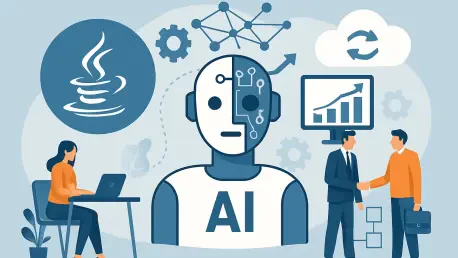Java has been a stalwart in the world of enterprise software development for three decades, continually evolving, integrating modern technologies, and fostering a dynamic global developer community. Chloe Maraina, a business intelligence expert with a keen eye for data science, discusses Java’s enduring appeal and its transformative role in AI integration, community engagement, and enterprise innovation.
Java is celebrating its 30th anniversary with remarkable resilience. Why has it maintained a leadership position in enterprise adoption and developer popularity?
Java’s success seems to boil down to its reliability and adaptability. Over the years, Java has proven its capability to solve real-world problems efficiently, which is vital for enterprises. The language’s architecture and ecosystem provide stability, portability, and scalability. Additionally, the vast community support and consistent enhancements keep Java modern and in-demand. Enterprises can’t help but trust a language that consistently delivers results and evolves with their needs.
With AI being the future’s frontier, in what ways is Java contributing to AI innovation?
Java is laying a strong foundation for AI advancements by integrating seamlessly with modern architectures and frameworks. Symbolic reasoning plays a significant role here, allowing Java to enhance AI solutions with explainability, which is especially critical for regulated industries. The development of hybrid architectures, where symbolic AI complements machine learning, ensures robust AI applications that can be trusted by both developers and decision-makers.
Events like the Java 30Y Celebration Week highlight Java’s community engagement. Why are such events crucial for Java and its developers?
These celebrations are pivotal in strengthening community ties and fostering collaboration. They provide a platform for sharing the latest innovations, discussing future directions, and inspiring developers globally. A critical aspect is the sense of belonging and shared purpose that fuels individuals’ passion and drives collective progress. Java User Groups, in particular, accelerate personal and professional growth by enabling knowledge sharing and collective problem-solving.
Jakarta EE is a cornerstone in enterprise Java innovation. What makes it critical within the Java ecosystem?
Jakarta EE is the backbone for enterprise-scale Java applications, offering solid frameworks to build scalable and stable systems. Governed by the Eclipse Foundation, its open governance model ensures that developments reflect user needs instead of vendor priorities. This community-driven approach emphasizes standardization and flexibility, allowing businesses to innovate while ensuring stability—essential for enterprise success.
How does GraalVM enhance Java’s performance for modern applications, particularly in cloud environments?
GraalVM dramatically improves Java’s performance by offering advanced capabilities like ahead-of-time compilation. This leads to faster startup times and reduced resource consumption, which are crucial for cloud-native applications. It essentially debunks the myth of Java’s heaviness and ensures it can compete with other languages in terms of efficiency, especially in serverless deployments where speed and resource optimization are critical.
Java is navigating an ever-changing technology landscape. How does it continue to maintain its relevance in enterprise software development?
Java retains its relevance through constant evolution, guided by its robust community and governance structure. It adapts by integrating cutting-edge technologies, enhancing performance, and embracing new paradigms like AI. Its roadmap reflects actual enterprise needs, providing the foresight companies require to make long-term technological commitments. The predictability and stability Java offers are unmatched, making it hard for competitors to replicate.
In regulated industries, how does Java address compliance and provide trust in AI solutions?
Java tackles compliance issues in AI through hybrid AI architectures that incorporate symbolic reasoning—essential for explainability. Ensuring AI solutions can justify their decisions is pivotal in regulated sectors like finance, providing peace of mind for both enterprises and regulators. Guardrails embedded in Java-based AI systems guard against unpredictable outcomes, maintaining a standard of trust and reliability vital for compliance.
What is your forecast for Java’s future in enterprise settings, especially considering emerging technologies?
Java’s future looks promising as it continues to align effectively with emerging technologies. As enterprises prioritize both innovation and stability, Java remains a formidable choice due to its adaptive nature and vast ecosystem. The focus on integrating AI and enhancing cloud capabilities ensures Java will remain an indispensable tool for enterprise software development. The commitment to community-driven evolution further solidifies its place in technology’s future landscape.









